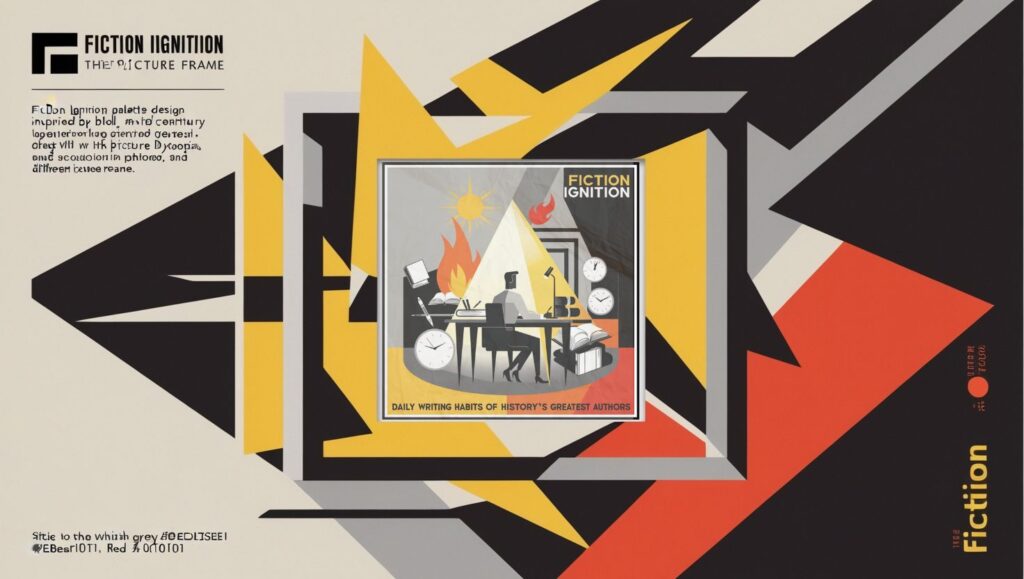Greetings, Fiction Igniters!
Let’s start with a truth bomb: writing every day is like eating your vegetables—not always glamorous, but it keeps your creative muscles lean, mean, and ready to dream! Now, before you roll your eyes, thinking, Oh, here comes another productivity lecture, hold your horses. We’re not going down a dull, drab road here. Nope. Today, we’re looking at the daily writing habits of some of history’s most legendary authors. Why? Because their routines can spark your imagination and make your pen (or keyboard) fly. Let’s dive in!
The Early Bird Gets the Manuscript: Ernest Hemingway’s Dawn Ritual
Papa Hemingway believed in starting early. He’d wake up with the sunrise and write until lunchtime. Why mornings? Hemingway once said, “There is no one to disturb you, and it is cool or cold, and you come to your work and warm as you write.” Imagine that: the world is still asleep, and it’s just you and your story.
Actionable Tip: Set aside your mornings for writing—even if it’s just 30 minutes. Don’t check your phone, don’t scroll—just write. Think of it as a date with your muse.
Example: Hemingway’s The Old Man and the Sea was reportedly written in bursts during these serene morning hours.
Stephen King: Write Like It’s a Job (Because It Is!)
Stephen King treats writing like clocking into a 9-to-5 job. He’s famously quoted saying he writes “every day, including Christmas.” King churns out 2,000 words daily, which is about 10 pages. His consistency is the secret sauce behind his massive catalog of spine-tingling tales.
Actionable Tip: Set a daily word count goal. Start small, like 300 words, and build up. Celebrate hitting those targets—you deserve it!
Example: King’s Carrie came to life through relentless daily writing sessions. Bonus fact: he almost tossed the manuscript in the trash before his wife rescued it. Who’s your cheerleader?
Maya Angelou: Find Your Sacred Space
Maya Angelou’s writing routine is the stuff of legends. She rented a hotel room, stripped it of all distractions, and got to work. No fancy desks, no distractions. Just her, a Bible, a deck of cards, and her creative genius.
Actionable Tip: Dedicate a specific space for writing, even if it’s a corner in your room. Keep it distraction-free and make it yours.
Example: Her iconic autobiography I Know Why the Caged Bird Sings came to life in those hotel rooms, proving that creativity flourishes in simplicity.
The Night Owl’s Anthem: Franz Kafka
For Franz Kafka, nighttime was the right time. He worked a demanding day job and turned to writing in the wee hours. Kafka believed the night’s silence unleashed his creativity. Imagine creating The Metamorphosis while the world slept around you—talk about dedication!
Actionable Tip: If you’re more of a night owl, embrace it! Block off an hour after dinner or before bed for uninterrupted writing.
Example: Kafka’s surreal worlds took shape during his midnight musings. Your late-night ideas might just be your best ones.
Toni Morrison: Embrace Rituals
Toni Morrison had a beautiful ritual: she would watch the sunrise with a cup of coffee before starting her writing. This quiet, reflective moment set the tone for her day and helped her tap into her inner world.
Actionable Tip: Develop a pre-writing ritual. It could be sipping tea, lighting a candle, or journaling a few thoughts. Rituals prepare your mind for creative work.
Example: Morrison’s Beloved is a testament to the power of intention and consistency.
My Two Cents (and a Personal Anecdote!)
Alright, here’s where I get real with you. I used to think writing daily was impossible. Life is busy, distractions are endless, and my cats (bless them) love walking on my keyboard. But I started small—just 10 minutes a day. Guess what? Ten minutes turned into 20, then 30. Writing became my anchor, my happy place. If I can do it—so can you.
Your Daily Writing Plan (In 3 Steps!)
- Pick Your Time: Morning, noon, or night—find your groove.
- Set Goals: Word count? Page count? A single sentence? Make it doable.
- Celebrate Wins: Wrote 100 words? High five yourself! Finished a chapter? Treat yourself to a donut or a dance party (your cats won’t judge).
So, what are you waiting for, Fiction Igniters? Dive into your writing groove, channel the greats, and make magic happen—one word at a time.
Farewell, My Literary Pyromaniacs!
So, remember, until next time: don’t write, ignite!





